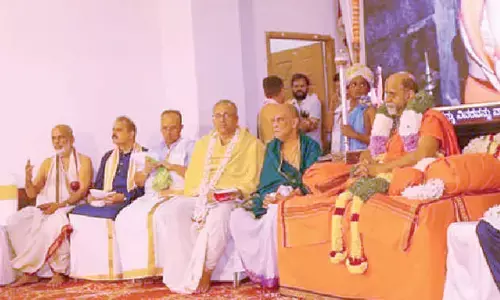Scientific temper: A Fundamental Duty

Scientific temper: A Fundamental Duty
Rational thinking and scientific truths will have disastrous consequences sometimes where authoritarian state and irrational society turn into serious enemies
Rational thinking and scientific truths will have disastrous consequences sometimes where authoritarian state and irrational society turn into serious enemies. The reason is lack of reasoned thinking. Greek philosopher Socrates was given death sentence, which he had to execute. There was a trial Socrates faced in 399 BC. Court was asked to determine the philosopher's guilt of two charges: one is: asebeia (=impiety, a criminal charge in ancient Greece for the "desecration and mockery of divine objects," for "irreverence towards the state gods" and disrespect towards parents and dead ancestors) against the pantheon of Athens. He was also charged with corruption of the youth of the city-state. They alleged that Socrates was "failing to acknowledge the gods that the city acknowledges" and "introducing new deities."
His friends, followers, and students encouraged him to flee Athens, which happens generally. On principle, Socrates refused to flout the law and escape his legal responsibility to Athens. Therefore, faithful to his teaching of civic obedience to the law, the 70-year-old Socrates executed his death sentence and drank the hemlock, as condemned at trial. He is an enigmatic figure who did not author any text but known mainly through the posthumous accounts of classical writers, his students such as Plato and Xenophon. Plato's dialogues are among the most comprehensive accounts of Socrates from which Socrates has become renowned for his contributions to the fields of rationalism, ethics and epistemology. This Platonic Socrates lends his name to the concept of the Socratic method, and also to Socratic irony.
Socrates is known for proclaiming his total ignorance; he used to say that the only thing he was aware of was his ignorance, seeking to imply that the realisation of our ignorance is the first step in philosophising.
Killing the reason
Suffering elimination for being rational continued up to this age. Narendra Dabholkar, the founder of the Maharashtra Andhashraddha Nirmoolan Samiti or Maharashtra Blind faith Eradication Committee, dedicated his life for reason and scientific thinking, worked tirelessly to inculcate scientific temper and the ideas of rationalism. Dabholkar's understanding of scientific temper was insightful: "As much belief as there is evidence for." He was assassinated on August 20, 2013. The state is yet to find who the culprits were. The All India Peoples Science Network, a network of over 40 Peoples Science Movements, has declared August 20 as the National Scientific Temper Day. There is a need to bring in many 'peoples' science movements' of the 1970s, similar to the Kerala Sasthra Sahithya Parishad established in 1962 on this occasion to inculcate scientific temper.
Scientific thinking has changed the world. From the doubt a question 'why' should arise and thinking to find answer leads to progress. Three apples taught us some science lessons.
Biblical tells us story of First Apple that was forbidden but eaten. This is about the Fruit of Creation. The Bible says God had created our world in seven days, the Garden of Eden (The Garden of Paradise) and its caretaker, the first humans Adam and Eve, who were allowed to roam in the garden with apples, pineapples, grapes etc. The story says that the God forbade Adam and Eve to eat any apple from his garden, as that was created as the "Fruit of Knowledge and evil." However, a serpent manipulated Eve and asked her to persuade Adam to eat and see what the fruit of knowledge holds in itself. As he took the first bite of apple God cursed them. Apple stuck in his throat. They were cursed to live in the world of sorrow and misery with the knowledge and evil of the apple.
The Second is Newton's apple that was not eaten: It correlated with Newton's law of universal gravitation. The story is: While Sir Isaac Newton was resting in an orchard, an apple fell on his head from tree. He started thinking about it. As he threw it up, again it came down. No matter how high he threw that, it was landing back on the ground. He found the pulling force of the Earth that brings down the apple to ground. He rightly named the force "Gravity." From this basic law of science, scientists could know the position of planets, orbits of satellite, information required to go in space, which were calculated with help of this law, and path of astronauts is determined by this essential equation.
The Third is Job's apple, that was half eaten: Founded by Steve Jobs, the Apple changed the world of smartphones/computers with iPhones, Macs, Apple Watch, Air pods and many more attractive and useful gadgets. Computer scientist and English Mathematician Alan Turing suffered tragic death after eating the apple laced with cyanide. An half-eaten apple was found on his bedside. Jobs chose that as the logo, to pay a tribute to enormous contributions of Turing to the field. All the three stories prove the progression we can see with rational thinking.
The forgotten duty
We have a duty to think. There is a set of duties which are called 'fundamental.' Not often discussed in the public domain is the relatively rare provision Article 51A. These 11 duties are specified under Article 51A, added by Indira Gandhi during Emergency by 42nd Amendment, 1976. Citizens have to abide by the Constitution, uphold the sovereignty, unity and integrity of India, and render national service if called upon to do so. There is one duty that is unique to India under Article 51A (h) that encourages the citizen to "develop the scientific temper, humanism and the spirit of inquiry and reform." It says, "It shall be the duty of every citizen of India to develop the scientific temper, humanism and the spirit of inquiry and reform."
This is further strengthened by clause (j) of Article 51-A that also casts a duty upon every citizen "to strive towards excellence in all spheres of individual and collective activity so that the nation constantly rises to higher levels of endeavour and achievement" An MP proposed to add another duty "(l) to participate in mass movement for cleanliness and propagate the message of clean India through his words and deeds." (By Amendment in 2018).
Unlike the fundamental rights under Part III of our Constitution, the fundamental duties are not enforceable through writs. They remain advisories or sermons. But they are meant to be a guiding light for the growth of the nation at both the individualistic and collective level.
Indian Constitutional courts have time and again stressed the importance of these duties in order to bring about excellence, surpassing merit, virtue, honest performance, dignity and eminence.
The Supreme Court in Minerva Mills case (1980) recognised the significance of fundamental duties, despite being non-justiciable, and held such duties are rules of law as they prescribe a norm of conduct to be followed. It further said only by reason of its non-enforceability, such duties and obligations do not cease to be rule of law.
The Karnataka High Court stated that every citizen of India is fundamentally obligated to develop scientific temper, humanism and spirit of enquiry. It is the duty of every citizen to contribute to reform society for a better way of life.
As BR Ambedkar says in his work Buddha or Karl Marx, "Nothing is infallible. Nothing is binding forever. Everything is subject to inquiry and examination."
There is much discussion about the Constitution of India, particularly Article 14, which states that "the state shall not deny any person equality before the law or the equal protection of the laws within the territory of India." Every such extraordinary power in the hands of authority will be in breach of the equality right.
Scientific Policy Resolution
In 1958, the Government published its Scientific Policy Resolution, which stated, "The dominating feature of the contemporary world is the intense cultivation of science on a large scale, and its application to meet a country's requirements." Scientific temper can be viewed through two lenses — one of the traditional scientific community and the other of society as a whole. Most of the students from our subsidised government institutions leave India in search of post graduate studies, research and jobs elsewhere.
The Science, Technology and Innovation Policy of 2020 states that in order for India to "march ahead on a sustainable development pathway ...towards achieving an 'Atmanirbhar Bharat,' a greater emphasis may be needed on developing traditional knowledge systems, developing indigenous technologies and encouraging grassroots innovations." The CSIR and the Departments of S&T and Biotechnology have attempted to advance science through their schemes, but intentions needed to be backed by resources at scale.
(The author is Dean & Professor, School of Law, Mahindra University, Hyderabad, and former Central Information Commissioner)
(The opinions expressed in this column are those of the writer. The facts and opinions expressed here do not reflect the views of The Hans India)











